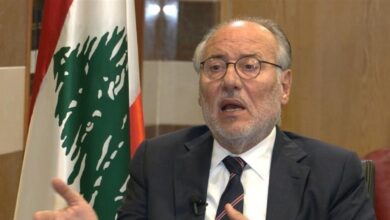Through prayer and contemplation we remember the history of the restoration of our Church
The beginning of a welcome speech by Daher, in which he stressed, “Love of people, brotherhood of religions, and human kindness. I have come to the Monastery of Our Lady of Good Service, to bring good news of the desired peace through prayer and supplication.” He said: “The Resurrection of Christ provided us with energy of hope and a leap of life, in the face of the tribulations, difficulties, and persecution that we are experiencing today, in our beloved homeland, Lebanon, and in the Arab world.” It is an energy of light that glows in the heart of every lover: of his church, his work, and his mission in this world. It is the energy of grace that fills the lives of our fathers and mothers, our children and youth, and the lives of every poor and needy person. As we enter the third centenary of partnership with the Church of Rome, we ask you, Your Beatitude, to dedicate our Royal Roman Church to the Comforter, the Holy Spirit, so that it can be a beacon of prayer, dialogue, and encounter among the children of Christ, in the universal Church, so that it can be the screaming voice in the face of falsehood, injustice, oppression, and deprivation. We are all certain, Your Beatitude, that difficulties, hardships and crosses, which are inevitable in life, will not and will not discourage you from your determination and your continuation of work and struggle, with the help of God Almighty, and with the intercession of our mother, the Virgin Mary, Lady of Good Service.
He added: “We raise our prayers with thanks and praise to God, who bestows abundant blessings on us, and we look forward to having, in this diocese guarded by God, an authentic bishop, in the near future, who will appear as a faithful servant and shepherd in the heart of God.”
He concluded: “In my name, in the name of the fathers and sons of the diocese, in the name of the monastic mayor and all the nun sisters, and in the name of this honorable ceremony, we welcome you, and we congratulate ourselves on your arrival, hoping that you will raise your pure right hand and bless me with my brother priests, my sister nuns, and all those participating with us in this historic family meeting.” This visit of yours is a blessing, an honour, a glory and a pride for us, and it is a new golden page recorded in the history of this monastery.”
Al-Absi
Al-Absi gave a speech in which he stressed the “unity of the church.” He said: “With prayer, contemplation and contemplation, we remember the history of our Church’s restoration of communion with the Roman Holy See in the year 1724, with the condition that we lead this blessed monastery that is dear to our heart, in the company of a generous group of brothers, gentlemen bishops, and children of priests, monks, and nuns, after a long wait, but without any relief.” Longing or weakening of wishing. Then thanks, dear sisters, for the sincere, heartfelt, filial reception that you gave us with all those who helped you, were pleased, shared with you, and demonstrated with you the great, pure, and present love in your hearts for the Church. Behold, then, we are here now in a good and blessed land to offer our best wishes and sincere love and to celebrate with you the Lord Christ who rose from the dead on the date in which you were founded, on this third Sunday after the Resurrection, when the Church reminds us of the great miracle he performed for the paralytic of Bethesda, for a cripple who was awaiting healing. For thirty-eight years without benefit, he healed him, put him on his feet, and sent him free to his home.”
He added: “There is no doubt that the main problem with this dislocated person was that it was dislocated. However, from our reading of the incident, we see that he had a bigger problem, which was the absence of someone to throw him into the pool. He was able to heal. It is enough for him to go down into the pool. However, he was not able to obtain this healing because he had not found anyone in thirty-eight years to throw him into the pond: “I have no one.” Healing was very close to him. The pond is centimeters away. But the people around him were kilometers away from him. “I have no one to throw me into the pool if the water moves.” We imagine what a person’s condition is like when he utters such a phrase, when this cry, this heartbreak, emerges from his chest. “I have no one”: means that there is no one with me, no one by my side, no one to support me. “I have no one”: It is isolation, the scourge of the age that often generates fatal despair: There is no one to console me, rejoice with me, feel with me, or see me as if I do not exist and have no regard or value. How much this reality indicates human selfishness, as every person seeks his own interests first without thinking about others. Many of those who frequented that pool were healed, but not one of them thought to help the paralyzed person after his recovery to go down to the pool. Rather, he left, contenting himself with the fact that he himself had received healing, regardless of whether or not someone else had recovered.
He continued: “Today we are suffering, among other things, a crisis of confidence. Our children, some of them lose confidence in us, and each has its own reason or reasons, and as a result they have become distant from us. Today’s Gospel teaches us how we can restore trust to them, or some of this trust, so that they do not turn away from us. That we be close to them, that we go to them, that we initiate them, as the Lord Jesus did with the paralytic: “Do you want to be healed?” Many things may prevent our children from coming to us, from getting close to us, from Jesus, from being comfortable with us, and not all of these things may be good, correct, and convincing. However, we must go to them first and discover little by little what is preventing them from coming to us. What we want, what we must tell them above all, is that they have someone who thinks about them and wants good and happiness for them: it is Jesus and we too, we are Jesus’ disciples whom he chose to be like him.”
He said: “On the Sundays that follow Resurrection Sunday, including the Sunday of today, the Church recites to us the Gospels from John in which Jesus appears coming in person to the tormented, suffering, harassed, desperate, betrayed, bewildered, and lost people: to the paralytic, to the Samaritan woman, to the blind from birth. To Thomas and the Apostles, to the disciples of Emmaus… This is so that the church can show us that the One who rose from the dead and ascended to the heavens is still with us, close to us, checking on us as He promised: “Behold, I am with you all the days, until the end of the age.” The mission that the Sisters of Good Service carries out is this: to alleviate people’s loneliness, people’s feeling that they are marginalized and abandoned and no one cares about them because they are weak and poor. Through the service they provide, they make people feel that they have dignity in our eyes and in the eyes of Jesus. This is how they return trust to them or give them confidence, so people return to them, to Jesus.”
He added: “In today’s message, the Acts of the Apostles says that the young doe that Peter raised from the dead “was rich in good deeds.” Following its example, this monastic order was launched in 1954 by the Most Merciful Bishop Youssef Al-Maalouf, pastor of the Melkite Greek Catholic Diocese of Baalbek, to carry out good works, so it was called “The Order of Our Lady of Good Service.” From that date until today, over the course of seventy years, the nuns have dedicated themselves, with dedication, humility, silence, and fatigue, to serving those who asked them to serve in seminaries, monasteries, bishoprics, patriarchates, orphanages, schools, and hospitals, directing their care in particular to the poor and deprived in Lebanon and Syria, without distinction of religion or origin. In this way, their service was one of those good deeds that Jesus Christ and the Apostles after him asked us Christians to have in a special way: “In this way, let your light shine before people, so that they may see your good deeds. And glorify your Father who is in heaven” (Matthew 5:16), the Lord Jesus tells us in the Gospel, and Paul adds, saying that we Christians were “created in Christ Jesus for good works” (Ephesians 2:10) and that Jesus “gave himself for us to redeem us from God.” All iniquity and purifies to himself a special people who are zealous for good works” (Titus 2:14), and the Apostle Peter adds, saying: “Walk in a commendable manner among the Gentiles, so that while they slander you as if you were evil, they may notice your good works and glorify God on the day of visitation” (1 Peter 2 : 12).
He continued: “What distinguishes our virtuous daughters and sisters with whom we celebrate this holy holiday is that their service is good, derived from Jesus Christ, the good shepherd and good teacher, who taught us how good service is. There are many and varied services in the world and many people work in these services. Services based on completing the duty, and in the best cases, performing the required work well. However, the good service that the Lord Jesus laid the foundation for is different. It is the service of love that is not linked to a job or duty, but rather comes directly from the heart and comes from the big to the small, from the strong to the weak, from the perfect to the imperfect, from the sufficiency to the needy. This is the righteous service with which the nuns of this holy monastery have been serving for seventy years, a service that is contrary to the usual service in the world from subordinate to superior, from weak to strong, from needy to rich, a service that the good teacher explained by saying: “The Son of Man did not come to be served, but to serve.” ” (Matthew 20:28), “And if I, the Lord and Teacher, have washed your feet, you also ought to wash one another’s feet (…) The servant is not greater than his master (…) And if you know this, blessed are you if you do it” (John 13: 14-17). Otherwise, the Lord says to us, “What reward have you? Do not the tax collectors themselves do this? Do not the pagans themselves do this? (Matthew 5:46-48). Good service, loving service, yes, “For a good man brings forth good things from the good treasure of his heart” (Matthew 6:45), says Jesus the Good Shepherd.
He concluded: “With this goal, this vision, and this virtue, the founder wanted the monasticism he was about to launch to be distinguished. In order for this advantage to be firmly established and always present in the minds of the nuns, the monastery was not built for them in a city, a town, or even a village, or near it or its parishioners, but rather in an isolated, poor place that almost resembles a farm, where everything and every neighborhood is in need of service, of love, To Hanan, there are especially good people with whom the nuns were able to establish pure and pure relationships of affection, friendship, gentle morals, and constructive cooperation, and to share with them the good and the bad. They were and were an example of how a person can live openly, receptively, proudly, and happy with those who show him another side of things. And life, and be a wonderful living example of the models of our Melkite Greek Catholic Church, which does not know contraction, factionalism, exclusivity, isolation, and so on.”
[previous_post_link]





